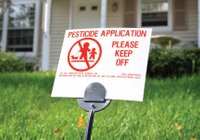Pesticides

Pesticides, herbicides and fungicides are toxic by design. They are designed to kill, reduce or repel insects, weeds, rodents, fungi or other organisms. Unfortunately, there are no chemicals that kill just one specific species. This holds true for organic pesticides and herbicides, as well. Organic pesticides that target mosquitos or ticks kill beneficial insects too.
The science on yard chemicals is very complicated, even more so because much of the scientific research is funded by the companies that produce these chemicals. Also, some yard chemicals seem to be able to mimic natural hormones and disrupt human endocrinic and immunologic systems, rather in extreme low doses than in high doses.
Facts
- 95% -98% of a common pesticide application will not touch its target, but will end up in non-targeted organisms, in the air and in our waterways.
- Most insects in the garden are beneficial, and essential for a healthy ecosystem.
- Insect populations have declined by more than 50% in the past 75 years, most likely due to pesticide use.
- Most drinking water in the USA today contains pesticides.
- Most of our bee honey is contaminated with pesticides.
- Pesticides can create a cycle in which we need more pesticides, because, with the use of pesticides, we have killed insects that provide natural pest control.
- Pesticides can lead to loss of soil quality, because it kills important microorganisms in the soil.
- A biodiverse habitat is more resilient and less prone to pest problems.
- Non-target insects and wildlife are also impacted by pesticides through indirect applications, such as pesticide drift, secondary poisoning, runoff into local water bodies, and groundwater contamination.
- Exposure to pesticides can alter an organism’s behavior, and impact its ability to survive.
- Reproductive abnormalities have been observed in mammals, birds, reptiles, fish, and mollusks at pesticide application levels considered “safe” by the Environmental Protection Agency (EPA).
- Pesticides can set off a chain reaction and disrupts the food pyramid. When targeted insects die, secondary consumers like birds and fish starve or must look for new locations to reside. The lack of secondary consumers then affects the tertiary consumers, causing them to starve or forcing them to move to new locations.
- Pests can develop a resistance to the pesticide, necessitating application of a new pesticide.
- Residual pesticides can become more concentrated at each level of the food chain, endangering mammals, such as ourselves.
Health Effects on Humans
We are aware that pesticides contain many different chemicals, so it is impossible to make overall claims about their impact. We advise you to go to our sources for more specific information. The facts mentioned here are taken over from the Environmental Protection Agency’s research on the more common pesticides. Mind that children are at a much bigger risk due to still developing brain, and both children and pets are also more vulnerable due to their small weight. Research suggests a link between long-term pesticide exposure and:
- Abnormal growth and development
- Impaired neurobehavioral development and functions, cancer, allergies, endocrine disruption.
- Reproduction and birth defects.
- Low sperm count and infertility.
- Early puberty.
- Testicular, breast, and prostate cancer.
- Altered sex ratio.
- Immunotoxicity.
- Increased susceptibility to infections.
Learn More
EPA About Pesticides> Pesticide News and Regulations Per State > Non-Toxic Communities > Grassroot Environmental Education > The Perfect Earth Project > Pesticides and Children’s Health > Beyond Pesticides > About Round Up > Canine Cancer > Neonicotinoids > Pesticides In Drinking Water > Impact Of Pesticides On Wildlife > Effect of Pesticides on Human Health > Green Gardening Ways to Fight Pests >
